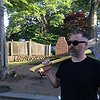Part 1
Name: Timothy William Walsh
Nationality: American
Occupation: Mastering engineer & recording artist
Bands/Projects: TW Walsh / Pedro the Lion / The Soft Drugs / Headphones
Labels: Graveface Records
Musical Recommendations: John McCaig does great work and he’s not very well known / Heba Kadry is another impressive up-and-comer.
What was your first mastering-related job - and what or who were your early passions and influences?
My first proper mastering job was my own solo album How We Spend Our Days, released in 1999 on a label called Made in Mexico. I had been recording and mixing music for several years at that point. I owned a CD burner and had been printing mixes to my computer instead of to DAT or analogue tape. I could burn CDs pretty easily but CDRs were still expensive and the process was error-prone.
I was eager to attempt to master my own album, to learn how to do it. The audio piece wasn’t much of a problem. However, I couldn’t find much information about properly writing PQ codes and things like that. I was ultimately able to figure that out. I burned a CD I thought would work for manufacturing. To my surprise, the manufacturer did not reject the disc. At that point, I didn’t know that much about the history of mastering. I didn’t have mastering influences per se.
For most artists, originality is first preceded by a phase of learning and, often, emulating others. In which way is this also true for you? How would you describe your own development as a mastering engineer?
Mastering is pretty technical. There’s a creative component to it, but that aspect is almost arbitrary. Up front, I had to learn a lot about digital audio. My aesthetic sense was already pretty developed.
In the beginning, I hated having to make things loud. It seemed destructive to me. Over time, I got more skilled and more flexible with how far I was willing to take things.
What were some of your main challenges and ambitions in terms of your approach to mastering when starting out – and how have they changed over time?
Workflow and documentation can be difficult. When you use analogue outboard gear, everything has to be done in real time. If you want to make even the smallest change, you need to do the whole song over. And you need to document your settings so that you can recall the same sound later if need be.
Educating inexperienced clients can be challenging too. Sometimes I work with a band that doesn’t have a solid understanding of the process, or they might have unrealistic expectations about what can be done at the mastering stage. Occasionally I get requests about taking the reverb off the vocals or changing the guitar sound. In those cases, I have to explain to the artist what the limitations are. Over time, my challenges have shifted more to time management and things like that.
What, to you, are the main goals of recording, editing and mastering?
In recording, you want to actualize the artist’s vision and make good music. With mastering, you want to create a cohesive album which sounds consistent all the way through.
Can you take me through your process on the basis of a production that's particularly dear to you, please?
My recent solo album Fruitless Research is a collaboration I did with Yuuki Matthews (The Shins, Sufjan Stevens, David Bazan, Crystal Skulls, Teardrops). I wrote the songs and recorded simple arrangements. I sent those recordings over to Yuuki (we did this remotely) and he did overdubs and mixed the songs. In some cases he replaced and rewrote a lot of the music, in other cases, he didn’t touch it much.
When all the mixes were complete, he and David Bazan stopped by my studio while they were on tour. We did some final overdubs here and there and mastered the record. I prefer not to master my own music but in this case it made sense.
In which way do the way music sounds change the way it is perceived? How do you see the relative importance of sound and composition?
The most important thing is the composition. Without a good song, nobody’s going to like it. But you can ruin a good song with a bad production and mix. And you can elevate a decent song to something great through production and arrangement.
I’ve learned to start with the song and also to start with the production. The aesthetic of the arrangement and the sound can have a huge impact on how it’s received, but often that is a superficial reaction on the part of the listener. Maybe they are fond of a certain genre and they gravitate towards that regardless of the song writing underneath.
I like productions that sound timeless - that combine elements of the past and the present. I love the sound of records from the '60s, '70s and '80s.
Recording can be related to a particular location, but thanks to technology, it no longer has to be. How do you see the relation between sound, location and space?
People are more important than locations. When it comes to recording, I’d prefer to work with someone gifted remotely than to work with someone less gifted in person. Thanks to technology, geography is no longer an obstacle.
In how far are the objective, universal and measurable parameters for what constitutes quality in a recording? Do you see mastering more as an art or a science?
Mastering is more of a science. There aren’t many creative decisions to make during the process, compared to mixing, for instance. You’re working with a stereo file. You can’t easily go in and make changes to individual instruments. Mostly it’s about adjusting the dynamics and EQ. I try to at least do no harm.






